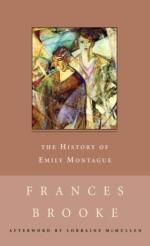|
This section contains 5,018 words (approx. 17 pages at 300 words per page) |

|
SOURCE: "Frances Brooke's Early Fiction," in Canadian Literature, Vol. 86, Autumn, 1980, pp. 31-40.
In the following essay, McMullen stresses the importance of Brooke's early writing, noting that her translations of French epistolary novels helped her develop her own novel-writing techniques. McMullen demonstrates that The History of Lady Julia Mandeville anticipates many of the themes and formal techniques employed in Emily Montague.
Finding herself at Quebec in 1763, Frances Brooke (1723-1789) made the most of the opportunity to transmute some of her experiences and observations into fiction. The result, The History of Emily Montague (1769), is well known in Canada. Yet criticism of this work has rarely, and then only briefly, alluded to Brooke's earlier writing which prepared her to make such effective use of her Canadian experiences.1 Her earlier novel, The History of Lady Julia Mandeville (1763) was, in fact, more popular in its day than Emily Montague and deserves consideration in...
|
This section contains 5,018 words (approx. 17 pages at 300 words per page) |

|


